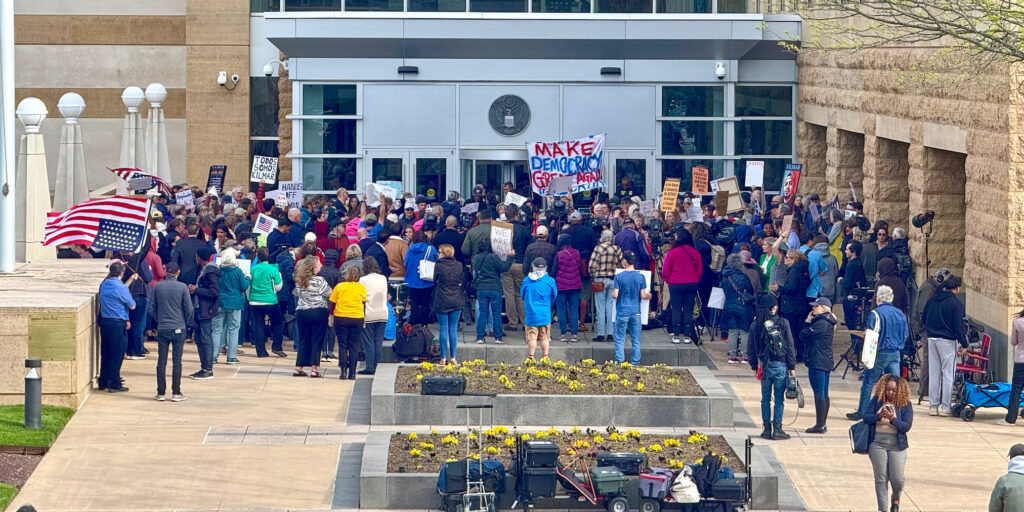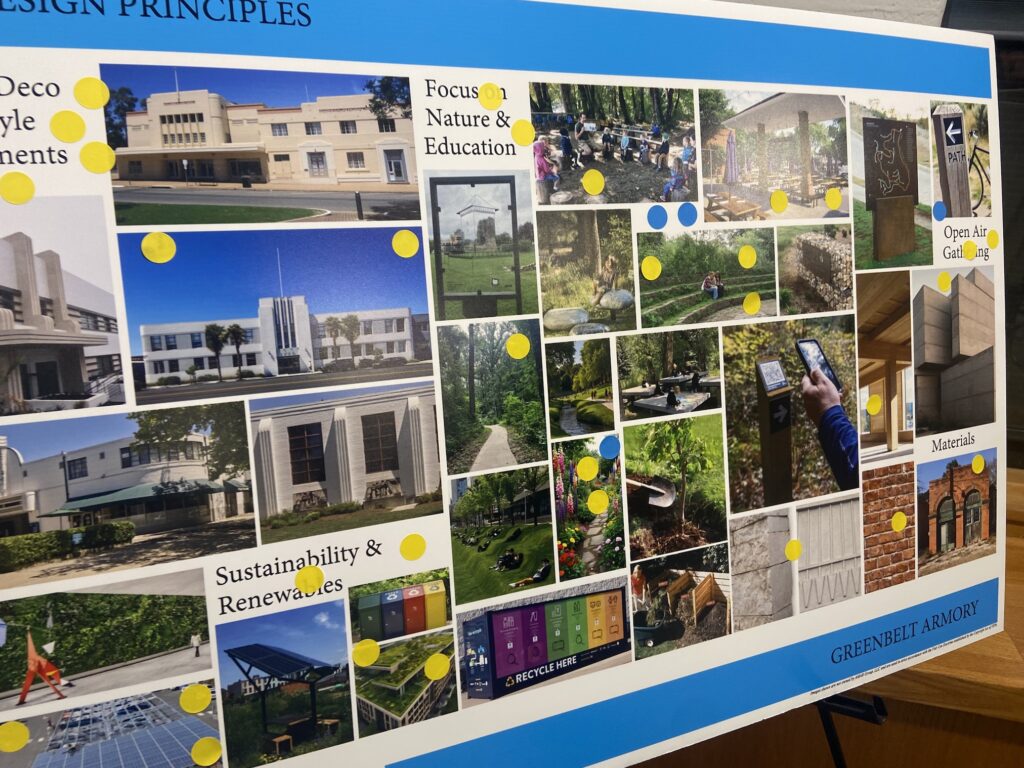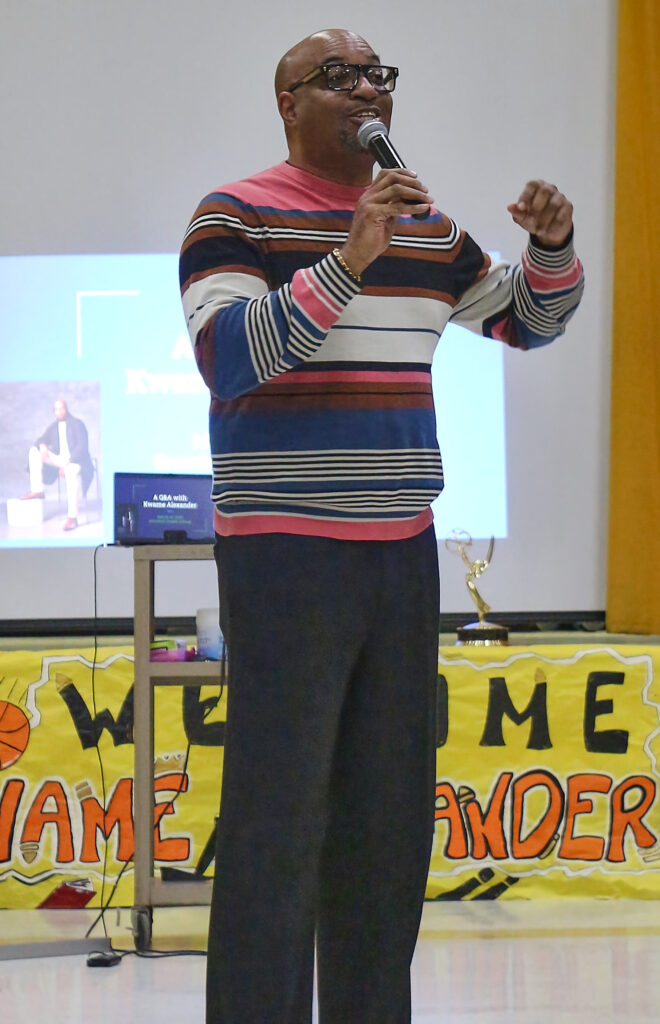On Thursday, December 21, Greenbelt City Council held a listening session at the Springhill Lake Recreation Center gym. Its purpose was to capture the views of Greenbelt residents living in the western segment of the city on the appointment of a councilmember to replace Councilmember Ric Gordon, who died suddenly shortly after the election this November. Perhaps the only thing everybody at the meeting agreed on was the high esteem in which Gordon was held and the loss his death was to Franklin Park’s residents.
Mayor Emmett Jordan introduced the meeting, at which about 25 members of the public were present, only a handful of whom lived in Franklin Park. He explained the meeting’s purpose was not to engage in debate but for councilmembers to hear what residents thought about the methodology and criteria adopted to identify and qualify candidates for the position. He listed criteria council would use to decide among the candidates. Unfortunately, the list was not entirely audible. Asked later for the list of criteria, Jordan said, “The questions/lists shared at the Springhill Lake Recreation Center Listening Session last week are ‘rough drafts,’ to be finalized during our worksession on January 3. This will allow for the inclusion of suggestions from the public, as well as additional thought and consideration by council … The SHLRC gathering was a ‘listening session’ or public hearing, so council has not formally discussed the merits of suggested criteria on that ‘rough draft’ list. This ‘decision-making matrix’ will shape the questions to be asked during interviews.”
Whether it will alter the outcome remains to be seen, but in the latter part of the meeting, 15-year Franklin Park resident Kevin Lockhart (known fondly to generations of kids in Franklin Park as Coach Kevin) expressed a desire to be on council so that Franklin Park residents would have a voice. He noted that he hadn’t known how to accomplish the requirements for this but was keen to submit if it was possible. This added to a call (voiced by several others then and at other times) to extend the deadline for candidate submission. It also inspired offers by two already-submitted candidates, first James Whipple and then Julie Winters, to help walk Lockhart through the process.
Timing
If there was consensus among the audience, it seemed to be that council’s actions had been too hasty and that information was not sufficiently circulated, especially to residents of Franklin Park for which Gordon had been the champion and where communication to residents has historically been problematic. Jordan countered that the two-year term of office meant that spending more time on a replacement would be too large a percentage of the term and that council had pressing business to accomplish. Some suggested that alternative approaches would require a charter change, which would also take too long.
Speaking from the floor, resident Ed Fallon noted that when the city wanted to change the charter for its own purpose of allowing the appointment of a nonresident city manager, they had no trouble acting quickly. Councilmember Kristen Weaver pointed out that though the time to change the charter was relatively quick, the waiting period before a charter change could be enacted was 40 days, adding to the initial delay.
According to Jordan, the city has had funds set aside for some time for a comprehensive overhaul of the city charter.
Applicants
After some pressing by the audience, Jordan read out the names of those whose applications were still at that time in the process of being vetted (Matthew Inzeo, Amy Knesel, Leon J. Schachter, James Whipple, April Tantor and Julie Winters, all of whom except Inzeo and Tantor were present); none is a resident of Franklin Park. Mentioned several times was a desire that the city be divided into wards, each of which elected its own representative – with Schachter citing his own experience in Cheverly as a councilmember for Ward 4 where, even though some wards in areas with a majority of apartments elected their representative on the basis of a handful of voters, that sector of the city is still always represented.
Dissent
Councilmember Rodney Roberts several times interjected his disapproval of council’s process, having earlier voted against it. At one point he remarked, “It’s all baloney” and noted that there was “time to change the process.” He stated that he was “embarrassed” by the stance taken by council and felt like the council meeting at which the strategy was decided was “snarky” and “like the Keystone Cops.”
The Electorate
A core element in the discussion was the nature of Franklin Park’s electorate, why it didn’t turn out in force for municipal elections or meetings and the difficulties inherent in encouraging participation. Longtime Franklin Park residents Carolyn Lambright-Davis and Reverend Ray Raysor and his wife René Raysor were eloquent in describing the diversity of Franklin Park’s population and the issues in the city’s ability to communicate effectively.
Lambright-Davis noted that with 2,877 residences and over 9,000 residents (approximately 40 percent of the city’s population) it seemed that more resources could be addressed by council to reaching out.
Raysor said, “Gordon worked hard to make a bridge and that’s gone.” He felt strongly that the new councilmember should be a resident of Franklin Park. René Raysor noted that the elementary school had difficulty in getting enough parents to form and maintain a PTA. She felt that residents had “checked out.” She characterized town hall meetings as a “middle-class type of response.”
Lambright-Davis stressed the positive – the signing of the contract for a new playground, for example – and stated that a few residents such as herself and the Raysors were constantly working in the community to try to bring it together. She described herself as optimistic for the development. Jordan noted that the city didn’t have the resources to put a flyer on every door.
Factors raised as causes of Franklin Park residents’ lack of participation included a substantial fraction of residents who may not read English, families where the breadwinners were working two or more jobs to make ends meet and inadequate communication by the city. The scarcity of News Review boxes for newspaper distribution was also noted as a factor (see note below).
City resident Michael Hartman speculated that the reason Franklin Park residents did not show up for such meetings was that they had come to have low expectations of the city and therefore didn’t see the point of bothering because nothing would come of it.
Flawed Location
Unfortunately, the meeting was much hampered by the venue. A low-pitched but very loud and invasive roar from an air handling unit made the meeting partially inaudible in the room and apparently even less audible electronically. A request to turn off the loud unit couldn’t be carried out.
Nonetheless, attendees battled on with frequent exhortations to hold the mic closer and the occasional piercing squeal from sound system feedback.
(Editor’s Note: About five years ago, the management of Franklin Park requested that the News Review not be distributed door to door. Of an original two outside boxes and one inside rack put in place in the development at that time, one box was set on fire and the rack stolen leaving only one all-weather box in the development. To make up for this lack of physical access to the newspaper, Franklin Park agreed to email a provided summary and link to its residents every Thursday. This has been faithfully provided by the newspaper but not 100 percent distributed to renters.
In addition, for two years, the News Review included in the email two or three stories translated into Spanish. After multiple appeals for feedback from Spanish readers, no responses were received to indicate that the stories were read and the service was discontinued.)
A second listening session will be held in Greenbelt East at the Greenbriar Community Center, 7600 Hanover Parkway, from 10 a.m. to noon on Saturday, December 30.



